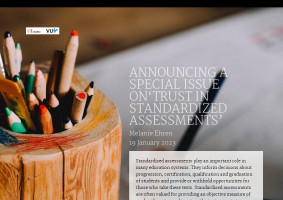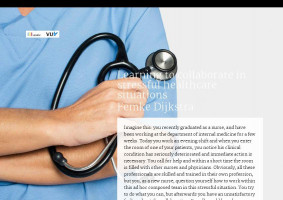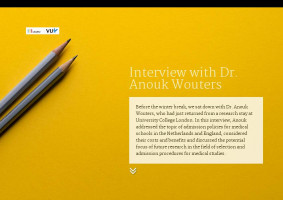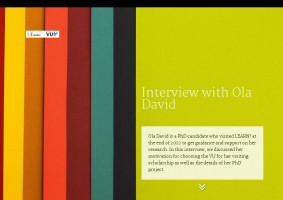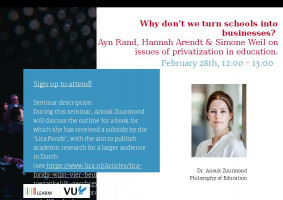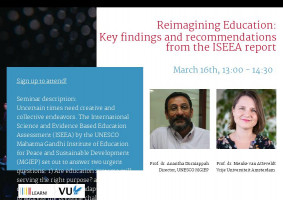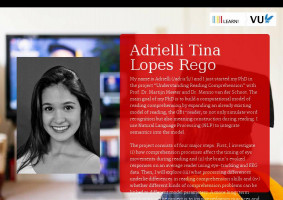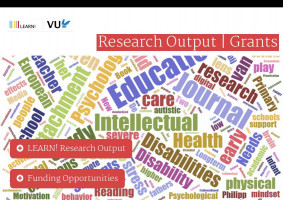Before the winter break, we sat down with Dr. Anouk Wouters, who had just returned from a research stay at University College London. In this interview, Anouk addressed the topic of admission policies for medical schools in the Netherlands and England, considered their costs and benefits and discussed the potential focus of future research in the field of selection and admission procedures for medical studies.
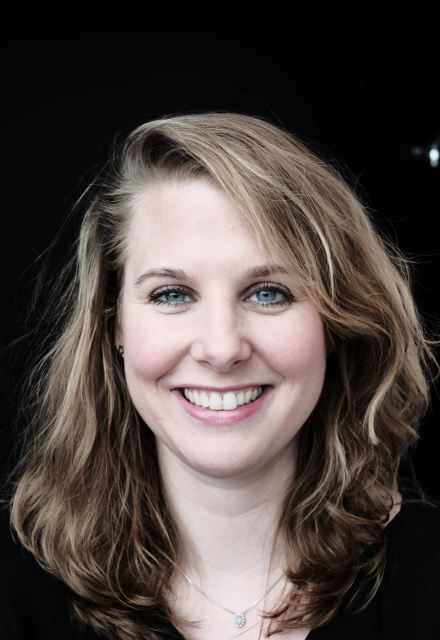
What was your main motivation to visit University College London?
There were several reasons, but mainly to supervise a PhD student. I am an assistant professor in the field of research and education. Secondly, I am part of the Motivation for Lifelong Learning program within LEARN!. My research topics are mainly focused on selection and admission procedures for medical studies, including the issue of diversity and inclusion. For almost a year now, I have been supervising a PhD student at University College London. She is doing research on stakeholder perception on contextual admissions, which are a way to increase equity in medical school admission procedures.
What are the admission procedures for medical schools based on in the Netherlands?
The Netherlands has a history of lottery-based admissions for medical studies. To give an example, we currently have about 4 applicants for each spot for medical studies here at VU, meaning there are 350 places and over a thousand applicants. For a long time, students in the Netherlands were admitted based on a lottery, which was weighted for GPA. Later on it was thought of as unfair, because in a lottery there was a chance that the high achieving students would not be selected and admitted. The lottery-based system was gradually changed to a selection-based procedure. There was also a time period when we had both the lottery and the selection at the same time, but now we have selection-based admissions only.
Has the selection-based system proven to be more effective so far?
This is interesting, because this is what I was focusing on in my own PhD together with a group of other researchers in the Netherlands. What we all saw was that selected students sometimes outperform the lottery admitted students, but the differences are very small, meaning that the gains of this system are barely noticeable. Together comes the fact that a lottery is a simpler solution, as it requires less time and effort as compared to such an intense procedure like selection.
DO YOU HAVE ANY HYPOTHESES ON WHY THIS MIGHT BE?
Especially in medicine, we rarely have any issues with performance. Drop-out is also almost never a problem. Even back in the days of the lottery-based admission system, the performance level was always high, meaning there was simply not much room for improvement once it was changed to selection.
At the same time, however, there were concerns about how using selections would impact student diversity. Currently, I am also supervising Lianne Mulder, one of our PhD students, who has found that since we have made that change to selection, student diversity has decreased. Diversity in terms of gender has been a problem since a while, as there are way more females than males in medical schools. Another important factor is the socioeconomic background- we have observed that the wealthier the students, the higher their chances of being admitted. Furthermore, ethnic minorities have much lower odds of admission, which impacts what the student body looks like. Consequently, there is a lack of representativeness of the patient population that the current students and future doctors will serve. What makes the issue even more complex, is that in order to reach a representative student population, some directed efforts are needed. However, in the Netherlands it is not allowed to take into account the barriers that some students have had to overcome throughout their education pathway which may have influenced their admission process for medical studies.
Are similar issues regarding admission policies present in England?
Yes, there seem to be the same issues, but in England it is allowed to take the disadvantages students may face into account, such as their socioeconomic background. Medical schools there acknowledge that some students will have less opportunities to obtain higher scores in pre-university education, which is what they are trying to account for in the selection procedure by considering the differences between students based on their socioeconomic background.
How does that work in practice?
One way to do it is contextualised admissions which I have mentioned before. What those entail is that when students apply for medicine, if based on their background they can be deemed as underprivileged, then with the implementation of that procedure, there will be certain requirements in terms of previous academic performance. For that group of students these students the requirements will be lower, because it is acknowledged that they didn't have the support and resources to obtain the higher grades like the students with a higher socioeconomic background.
Is the PhD student you are supervising also focusing on a comparison between the policies in the Netherlands and England?
Not really, for now her study is focused on the context of those policies and how different stakeholders perceive these contextual admissions. Accounting for the stakeholders’ opinions is an important factor to consider, because it is evident that despite those policies, some students still can’t reach the educational goals they have. The system is not working perfectly in England. The same goes for the Netherlands- it is important for making such policy changes to understand how the stakeholders perceive them. For instance, there are ongoing discussions about the change from lottery to selection in the Dutch parliament. There are certain concerns that selection, similarly to the lottery, has undesirable consequences. Those concerns are present even though it was because of the public opinion that these changes happened in the first place. This again shows how important for such policy changes and healthcare it is to be fully accepted by the stakeholders. And that is what we are looking at in her research- how stakeholders perceive these contextual admissions, together with the opinion of prospective students and the already selected ones. On top of that, we investigate the opinions of those involved in policy-making, as well as in the execution of the admission processes, which gives us a whole range of stakeholders. What is more, in England there are some very prestigious universities and the less prestigious ones. While the very prestigious schools can be very selective, the others aren’t. That is why we have to make sure to include people from different ranges of universities.
What was the goal of your visit apart from the supervision?
The supervision was the main point of my visit, along with attending a seminar organised by UCL together with Sciences Po. Apart from the attendees from these two universities, there were a couple scholars from Germany and me representing the Netherlands. We had a chance to discuss our own research and to see if we could collaborate altogether in the future on research in selection and diversity. During the seminar, I witnessed that societal influences and responses to changes such as the admission system (like ours from lottery to selection) are quite similar across these countries. What we all noticed was that in this context, the response to these changes has to do with how people want to protect the status quo, which is usually a situation in which the privileged want to secure their prosperity. And when that is challenged, like in the case of the Netherlands wanting to change back to the lottery-based selection, it is those same people that are concerned the most.
We saw lots of commonalities in this respect across all four countries- we saw the same things happening, especially the urge to protect the privileged.
It was very insightful for me, because normally we all just focus on the context of our own country and don't pay attention to the fact that the problem we are facing may be universal.
Is the research landscape different in England than in the Netherlands, also in the context that we have just discussed?
When it comes to my topic which is selection diversity and equitable admissions, because of the fact that practice is so much different from the Netherlands, so is the research. For instance, in England they get to study policies like the ones we just discussed, meanwhile in the Netherlands we are not even allowed to have such policies implemented. This makes the focus very different, which for me is very interesting to see, mostly because what they already have in England is what we hope to achieve with our research in the Netherlands. Moreover, it is fascinating to see what consequences such policies have in a country that has already implemented those, like England.
Did you witness anything that already works well in the Netherlands but could be improved in England?
Yes, especially at the conferences I have noticed that people are alway curious to hear about our findings regarding the lottery-based system, as it is something unique. I know that in many countries they also struggle with diversity and effectiveness of selection procedures, so they all at some point think ‘shouldn’t we just use the lottery?’. Since the Netherlands has already done it, together with a large body of research on its effectiveness, that is what other countries like England find so interesting.
Furthermore, what we see in our research is that the applicant pool is not that representative of the general population. The problem in the Dutch context is that already at the age of 11 or 12 we know that socioeconomic and migration background can play a role in the advice given to students concerning which school track to follow in the future. It is important to emphasise that this is actually the level that should be targeted and where we could make the most significant changes. Unfortunately, as medical schools we don't have much influence on that.
In England on the other hand, you have the issue of huge differences between public and private schools, already at the level of primary and secondary education. In fact, 80% of all medical school students come from only 20% of secondary schools, which are often some very specific private schools. That is what I think both England and the Netherlands have in common- already at the level of primary and secondary education the students are placed in tracks which makes some of them better equipped to end up in higher education, especially medical schools.
What would you say should be stressed the most in future research in this field?
Definitely more international collaboration, more comparative studies and more socio-political influence on the policies in question. These are the things I would like to see being studied in the near future in order to get a more holistic view on how education is viewed across countries.
Furthermore, I have witnessed a common mindset of people who claim they understand the need for equity in schooling, but at the same time want excellence. What is more, they perceive the relationship between these two as a trade-off. It is important to realise that if you invest in diversity you will not lose quality. In fact, it will most likely be the opposite; there is a whole line of research proving that investing in student diversity leads to better quality.
Next, there are a lot of studies focusing solely on the individual when choosing candidates for medical schools. A lot less is talked about what kind of healthcare workforce we actually need and how we can improve the educational climate and the work environment by making sure it is diverse and inclusive. This is where the focus should be.
.





